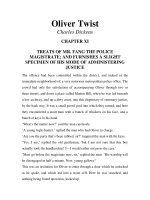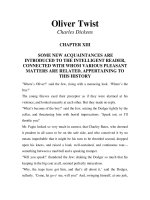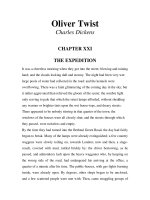LUYỆN ĐỌC TIẾNG ANH QUA TÁC PHẨM VĂN HỌC-Pride and Prejudice -Jane Austen -Chapter 26
Bạn đang xem bản rút gọn của tài liệu. Xem và tải ngay bản đầy đủ của tài liệu tại đây (26.92 KB, 10 trang )
Pride and Prejudice
Jane Austen
Chapter 26
Mrs. Gardiner’s caution to Elizabeth was punctually and kindly given on the
first favourable opportunity of speaking to her alone; after honestly telling
her what she thought, she thus went on:
‘You are too sensible a girl, Lizzy, to fall in love merely because you are
warned against it; and, therefore, I am not afraid of speaking openly.
Seriously, I would have you be on your guard. Do not involve yourself or
endeavour to involve him in an affection which the want of fortune would
make so very imprudent. I have nothing to say against HIM; he is a most
interesting young man; and if he had the fortune he ought to have, I should
think you could not do better. But as it is, you must not let your fancy run
away with you. You have sense, and we all expect you to use it. Your father
would depend on YOUR resolution and good conduct, I am sure. You must
not disappoint your father.’
‘My dear aunt, this is being serious indeed.’
‘Yes, and I hope to engage you to be serious likewise.’
Well, then, you need not be under any alarm. I will take care of myself, and
of Mr. Wickham too. He shall not be in love with me, if I can prevent it.’
‘Elizabeth, you are not serious now.’
‘I beg your pardon, I will try again. At present I am not in love with Mr.
Wickham; no, I certainly am not. But he is, beyond all comparison, the most
agreeable man I ever saw—and if he becomes really attached to me—I
believe it will be better that he should not. I see the imprudence of it. Oh!
THAT abominable Mr. Darcy! My father’s opinion of me does me the
greatest honour, and I should be miserable to forfeit it. My father, however,
is partial to Mr. Wickham. In short, my dear aunt, I should be very sorry to
be the means of making any of you unhappy; but since we see every day that
where there is affection, young people are seldom withheld by immediate
want of fortune from entering into engagements with each other, how can I
promise to be wiser than so many of my fellow-creatures if I am tempted, or
how am I even to know that it would be wisdom to resist? All that I can
promise you, therefore, is not to be in a hurry. I will not be in a hurry to
believe myself his first object. When I am in company with him, I will not
be wishing. In short, I will do my best.’
‘Perhaps it will be as well if you discourage his coming here so very often.
At least, you should not REMIND you mother of inviting him.’
‘As I did the other day,’ said Elizabeth with a conscious smile: ‘very true, it
will be wise in me to refrain from THAT. But do not imagine that he is
always here so often. It is on your account that he has been so frequently
invited this week. You know my mother’s ideas as to the necessity of
constant company for her friends. But really, and upon my honour, I will try
to do what I think to be the wisest; and now I hope you are satisfied.’
Her aunt assured her that she was, and Elizabeth having thanked her for the
kindness of her hints, they parted; a wonderful instance of advice being
given on such a point, without being resented.
Mr. Collins returned into Hertfordshire soon after it had been quitted by the
Gardiners and Jane; but as he took up his abode with the Lucases, his arrival
was no great inconvenience to Mrs. Bennet. His marriage was now fast
approaching, and she was at length so far resigned as to think it inevitable,
and even repeatedly to say, in an ill-natured tone, that she ‘WISHED they
might be happy.’ Thursday was to be the wedding day, and on Wednesday
Miss Lucas paid her farewell visit; and when she rose to take leave,
Elizabeth, ashamed of her mother’s ungracious and reluctant good wishes,
and sincerely affected herself, accompanied her out of the room. As they
went downstairs together, Charlotte said:
‘I shall depend on hearing from you very often, Eliza.’
‘THAT you certainly shall.’
‘And I have another favour to ask you. Will you come and see me?’
‘We shall often meet, I hope, in Hertfordshire.’
‘I am not likely to leave Kent for some time. Promise me, therefore, to come
to Hunsford.’
Elizabeth could not refuse, though she foresaw little pleasure in the visit.
‘My father and Maria are coming to me in March,’ added Charlotte, ‘and I
hope you will consent to be of the party. Indeed, Eliza, you will be as
welcome as either of them.’
The wedding took place; the bride and bridegroom set off for Kent from the
church door, and everybody had as much to say, or to hear, on the subject as
usual. Elizabeth soon heard from her friend; and their correspondence was as
regular and frequent as it had ever been; that it should be equally unreserved
was impossible. Elizabeth could never address her without feeling that all
the comfort of intimacy was over, and though determined not to slacken as a
correspondent, it was for the sake of what had been, rather than what was.
Charlotte’s first letters were received with a good deal of eagerness; there
could not but be curiosity to know how she would speak of her new home,
how she would like Lady Catherine, and how happy she would dare
pronounce herself to be; though, when the letters were read, Elizabeth felt
that Charlotte expressed herself on every point exactly as she might have
foreseen. She wrote cheerfully, seemed surrounded with comforts, and
mentioned nothing which she could not praise. The house, furniture,
neighbourhood, and roads, were all to her taste, and Lady Catherine’s
behaviour was most friendly and obliging. It was Mr. Collins’s picture of
Hunsford and Rosings rationally softened; and Elizabeth perceived that she
must wait for her own visit there to know the rest.
Jane had already written a few lines to her sister to announce their safe
arrival in London; and when she wrote again, Elizabeth hoped it would be in
her power to say something of the Bingleys.
Her impatience for this second letter was as well rewarded as impatience
generally is. Jane had been a week in town without either seeing or hearing
from Caroline.
She accounted for it, however, by supposing that her last letter to her friend
from Longbourn had by some accident been lost.
‘My aunt,’ she continued, ‘is going to-morrow into that part of the town, and
I shall take the opportunity of calling in Grosvenor Street.’
She wrote again when the visit was paid, and she had seen Miss Bingley. ‘I
did not think Caroline in spirits,’ were her words, ‘but she was very glad to
see me, and reproached me for giving her no notice of my coming to









